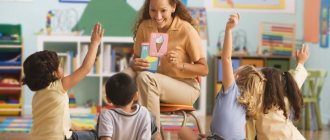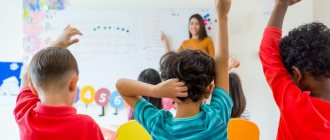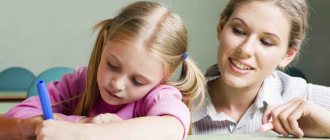Teacher self-development program 2016-2017
Relevance:
The development of communication skills—the ability to communicate with adults and peers—is one of the necessary conditions for the success of educational activities and, at the same time, the most important area of social and personal development. It is known that an effective means of developing children when they enter the world of social relations with the outside world, people, and nature is role-playing play. The success of performing game actions, the ability of children to live in a single children's team, the development of children's speech horizons and communication skills depend on the correct management of the game, on the timely enrichment of role-playing games.
In addition, recently the most pressing problem has been the introduction of modern gaming technologies into the educational practice of preschool institutions.
The growing popularity of gaming technologies makes it urgent to improve the professional competence of teachers in this area.
Thus, the program was developed due to the particular relevance of the problem of developing communication abilities and skills in children of senior preschool age and developing the professional competence of a teacher in the designated direction.
Target:
increasing the level of professionalism and pedagogical skill, the quality of the educational process in the direction of using role-playing games in the development of communicative abilities and skills in children of senior preschool age.
Tasks
:
Increase your own level of knowledge by studying the necessary literature and searching for information on the Internet.
Develop a long-term plan for working with children, parents and teachers of preschool educational institutions.
Prepare diagnostics for the beginning and end of the school year.
Create an additional educational program and organize the work of the “Magic World of Games” circle.
Create a subject-development environment in the group, supplement the “Center for Role-Playing Games” with the necessary attributes for games.
Prepare and conduct consultations for teachers and parents.
Prepare a creative report for the teaching council and parent meeting on the results of the work.
List of questions for self-development:
study of psychological, pedagogical and methodological literature;
development of software and methodological support for the educational process;
research activities;
analysis and evaluation of the results of one’s activities and the activities of children;
continue to study the teaching experience of other teachers;
Expected result:
Mastering modern forms and methods of developing communication abilities and skills in children of senior preschool age using role-playing games.
Preparatory stage
TECHNOLOGY OF SELF-DEVELOPMENT OF TEACHER
Lecture No. 8 (3 hours)
TECHNOLOGY OF SELF-DEVELOPMENT OF TEACHER
People are not born, but become what they are.
K.A. Helvetius
- Concept, content of professional and personal self-development.
- Technology for organizing teacher-educator self-development: methods, means, practical recommendations.
1. Concept, content of professional and personal self-development.
The success of teaching activity largely depends on the ability and ability of a young teacher to mobilize his efforts for systematic mental work, organize his activities rationally, overcome difficulties during independent preparation for classes, relieve emotional and mental overload, and manage his emotional state. These qualities are not given from birth or as an appendix to a diploma, but are the result of long-term work on oneself.
This work is of particular relevance today, when the importance of self-discipline and self-government increases, when success in life increasingly depends on independence, the ability to use the internal reserves of the individual, develop abilities to the maximum, and demonstrate creative activity. In pedagogy, such work on oneself is called self-education and self-development.
Self-education and self-development is a conscious practical activity aimed at the fullest possible realization by a person of himself as an individual.
Professional self-development and self-education is a conscious activity aimed at improving one’s personality in accordance with the requirements of the profession for a person. Personal self-development and professional self-education are inextricably linked.
Both processes are complex in their structure and implementation, however, mastering the technology of professional self-development will help the future teacher productively organize independent preparation for professional activity and mastery.
What are the components of self-development, the components of professional self-education? What are the ways, means and methods of mastering the process of self-education?
Studying the life and work of great people convinces us that a critical attitude towards oneself and the results of one’s activities most of all stimulates a person to constant personal and professional self-improvement. Thus, Albert Einstein considered himself not talented, but hardworking, and attributed his achievements in science to his enormous capacity for work. Therefore, work on self-education begins with self-radiation, awareness of one’s successes and failures, with dissatisfaction with oneself, which arises in the process of comparing one’s work results with the achievements of other people, evaluating one’s actions, analyzing one’s mental states and experiences (see Appendix 4). This is facilitated by developed reflexive skills that allow you to intelligently and objectively analyze your judgments, actions and, ultimately, your activities as a whole. Reflection is an analysis of one’s own actions and states. Self-reflection helps you realize your shortcomings, stimulates the desire to improve the situation, to change something in yourself.
The next step in self-education is the formulation of goals, that is, goal setting as the choice of personally significant goals for self-development. This is a very important step in the process of professional self-education. After all, the effectiveness of such work depends on the choice of goal. The broader and more significant the goal, the more likely it can become a perspective in a person’s life. Thus, the goal of “not living by a lie” (A.I. Solzhenitsyn), becoming an excellent specialist in one’s field, bringing as much benefit to people as possible, acts as a life perspective. It cannot be realized in a short time, but a person should strive for it all his life. Such perspective goals should be realized through the achievement of working goals - specific goals and objectives that can be achieved in a short period of time. For example, learn to organize your educational activities productively, develop cognitive interest in any subject important in professional development, develop perseverance, communication skills, organizational abilities, etc.
It is almost impossible to put forward, formulate, and even more so realize these goals without another important component of self-development - self-knowledge.
Self-knowledge and self-esteem - the study and assessment of one’s personal characteristics (interests, inclinations, abilities, character, etc.), typological properties of the nervous system in the process of self-observation and the use of special diagnostic methods.
It should be noted that all three of the above processes (reflection, goal setting and self-knowledge) are interconnected and interdependent. Reflection encourages self-knowledge and self-esteem, the results of self-knowledge stimulate the setting of goals, and formulated goals allow organizing self-study.
Self-knowledge allows you to create a holistic picture of your personality. Knowing the typological properties of one’s nervous system (strength, balance, mobility) makes it easier for a teacher to work on himself, as it allows him to build a self-development program taking into account performance, balance, emotional stability, mobility, plasticity or rigidity of nervous processes. Knowing your personal characteristics (extroversion-introversion, neuroticism), some character traits (leadership, ability to overcome difficulties, lability, social distance), the level of development of organizational and communication skills will help you create and adjust a program of professional self-education. Self-knowledge and self-esteem at some stage will allow the future teacher to draw up his own psychological portrait - a “Personality Map”.
“Teacher Personality Map” can be considered both as a guide to organizing self-knowledge (what to study?), and as material for further analysis of one’s personal properties (assessment of the level of development). It allows the future teacher to evaluate his strengths and weaknesses, to realize his capabilities, thereby drawing strength for further self-education, that is, to create motivation.
However, the desire to change oneself is not enough, and therefore, after putting forward the goals of personal self-development, it is very important to outline a program of actions for self-education within the framework of the educational and scientific activities of a student at a pedagogical university and choose methods for its implementation. The level of intellectual development of pedagogical university students is, as a rule, sufficient to draw up such a program.
The self-development program for a future teacher is a program of actions to achieve specific goals of self-education, taking into account the requirements of the profession for a person.
The process of self-programming of a personality is nothing more than the materialization of one’s own forecast about possible self-improvement (see in detail: Pedagogy; Academic manual / V.A. Slastenin, I.F. Isaev, A.I. Mishenko, E.N. Shiyanov. M .: School-Press, 1987. pp. 68-69).
When implementing the program, specific methods are used: self-persuasion, self-hypnosis, self-order, autogenic training. At the initial stage, the most effective method is the method of self-persuasion. Its essence is creating attractive goals, drawing in your imagination the prospects for self-development and future success. Simultaneously with this method, you can use autosuggestion (suggestion to yourself), aimed at self-regulation, that is, control of mental processes. Self-hypnosis is achieved through verbal instructions, mental reproduction of certain situations related to the achievement of set goals.
The self-order method is more emotionally intense. This is a volitional effort that involves the mobilization of all a person’s mental strength in an extreme or simply difficult situation, which, as a rule, is very significant for a person. Essentially, this is also self-persuasion, but used as an order to achieve attractive goals and objectives.
All methods of self-education are closely related to each other, intertwined and sometimes used almost simultaneously. Thus, a student who strives to develop his communication skills during teaching practice convinces himself that he will do well, that he will experience joy from communication, and at the same time remain demanding, attentive, etc. He instills in himself a certain positive attitude towards upcoming communication, when in a real situation he suddenly has to stay with the class for additional time, when fatigue has accumulated from prolonged communication and he no longer has enough mental strength. Under these conditions, he is forced to order himself to remain patient, sociable, and able to continue professional communication. Such situations allow one to reveal a person’s capabilities, and the individual’s resources are inexhaustible. Their maximum use is facilitated by a special method of self-development and self-education - the method of autogenic training.
Autogenic training is a method through which muscle relaxation, self-hypnosis, concentration of attention, and the ability to control involuntary mental activity occur in order to increase the effectiveness of activities that are significant to a person. The mentioned means of managing one’s mental state (means of self-regulation), as well as switching off and self-distraction are used in an optimal combination, taking into account the individual characteristics of a person (if necessary, the self-development program, means and methods are adjusted on the basis of self-control).
Self-control is the subject’s awareness and assessment of his own actions, mental processes and states, and the results of progress in self-development. The result of self-control is the correction of the self-education program.
Self-control presupposes the presence of an ideal, a standard. It may be a favorite teacher, but most often it is a collective image that reflects ideas about professional pedagogical activity. The quality of the reference will depend on awareness in this area. That is why it is so important to constantly replenish your knowledge about the essence, structure, ways of carrying out teaching activities, and the requirements of the profession for the individual (professiogram, or qualification characteristics). We tried to take all this into account when drawing up a self-development program - “Teacher Personality Cards”.
The result of work on self-education and self-development is positive changes in personality and successful advancement in educational and scientific activities. The latter manifests itself in improving the quality of activity and in realizing one’s successes. The higher the specific results of activity (points in the grade book, praise from teachers, evaluation of fellow students), the stronger the need for further self-development. No less important for the formation of the need for self-development is the awareness of the changes that have occurred in oneself. The most noticeable changes are in the cultural and intellectual sphere of man. Certain means are used for cultural and intellectual development. First of all, this is self-education - reading a variety of scientific, fiction, books about art, working with reference books. Everyone understands self-education in their own way: some strive to learn as much as possible about everything; others prefer to know as much as possible in a narrow field, usually related to professional activities. From the point of view of comprehensive development, it is advisable to combine general education with interest in a particular field of knowledge. Another important means of cultural and intellectual self-development is the use of special exercises to develop memory, thinking and speech. Let's look at some practical recommendations.
1. Intellectual development is closely related to general and cultural development, which should be combined with aesthetic, physical and moral self-improvement.
2. To develop your memory, you should:
- study systematically, constantly loading your memory with new information, connecting knowledge with practice;
—set clear memorization goals, know why and for what purpose this or that material is needed, where it can be used;
-before you remember, you need to understand;
-everything that needs to be remembered must be selected, comprehended, systematized, and connected with what was previously learned;
— remember the leading ideas and methods of their proof, then your memory will reproduce the details in your mind (you can’t remember everything!);
- create a good mood when memorizing, learn to see the new and unusual, interesting and necessary in the ordinary.
3. To learn to think, you must: - strive to see the main thing and prove what is more important and why;
— master basic mental operations (comparison, proof, analysis, synthesis, generalization, refutation);
- be critical of everything you read and study, have your own non-standard point of view;
—improve a penchant for wit, resourcefulness, and initiative in practical activities.
4. The art of mastering speech requires constant training and constant work on oneself.
The following recommendations will help you develop these skills.
- Never be dispassionate. In any conversation or speech, put maximum interest, passion, desire to explain, prove, and convince everything.
- The power of a teacher's word lies in his knowledge and beliefs. You can’t talk about what you don’t know and what you’re not convinced of yourself. Necessary: learn to speak naturally, simply, without complex turns of phrase and official phrases.
- Pay attention to speaking technique. The voice should naturally and meaningfully increase in volume and power of expressiveness, decrease, become light and sincere. The voice should not be too loud or too quiet.
4. Daily expressive reading will help develop speech abilities.
The means of managing one’s mental state include the creation of certain attitudes in the process of persuasion, self-hypnosis and self-command. Thus, a positive, optimistic attitude towards upcoming communication and work is of great importance and often communication partners become infected with the teacher’s confidence in success. The situation of success experienced by the teacher in the process of activity itself becomes a means of further self-education. Thus, the main means of self-development is professional activity - theoretical or practical, real or simulated. And all other means: self-education, special exercises, trainings, autogenic training as a means of learning to manage one’s mental states, creating an attitude for upcoming activities - serve in the service of such training, promoting self-improvement in the process of teaching.
It should also be noted that changes in one personal area entail changes in another. Thus, work on cultural and intellectual self-development will necessarily entail changes in the culture of behavior and will manifest itself in the desire to monitor one’s mental state. A cultured and literate person will not allow incontinence in emotions, will strive to organize his activities so as not to overwork, will strive for a rational distribution of time, which will lead to changes in the volitional sphere of his activities.
The teacher’s self-education program, which is also a means of his self-development, necessarily contains an assessment of teaching abilities and ways of their further development. Psychological science provides an opportunity to study the level of development of such abilities, and pedagogical activity is the main means of their development.
All personal changes (intellectual development, the ability to manage one’s mental states, strong-willed determination, cultural development, development of pedagogical abilities) themselves become a powerful stimulus in professional and personal self-development, as they form the need for self-improvement.
This is the technology of professional self-development. It should be remembered that each component included in it is necessary for successful mastery of the process of self-education and that the exclusion of at least one of them can make the technology either non-working or lead to errors that will not be easy to correct (see Fig. 14).
Thus, the process of self-education will not give positive changes, and the teacher will not be able to create an objective picture of the development of his personal qualities if self-knowledge and self-esteem are not first carried out. In this case, the self-education program will not be adequate to the individual, and self-education will not be effective. The absence of a goal-setting process in self-development technology will also make the self-education process ineffective, since the professional self-development program will not be motivated, and the absence of conscious self-education goals will make it unrealistic. No less important are the processes of self-control and correction, which allow you to realize your progress, compare the results achieved with the expected ones, notice mistakes in time, adjust your further program of action, and choose methods and means of self-education.
????2.Technology for organizing teacher-educator self-development: methods, means, practical recommendations
When organizing professional self-education, you must adhere to the following sequence of actions.
1. Goal setting: selection of personally significant goals and objectives of self-education.
2.Planning, choosing actions, creating a self-education program.
3. Choice of methods and means of self-education.
4.Implementation of the goals and objectives of the professional self-education program in educational and scientific activities.
5.Self-control: comparison of achieved results with expected ones.
b. Corrections of the self-education program taking into account the results of self-control and self-esteem.
The results of professional self-education, in turn, become an incentive for professional self-education.
Rice. 14. Technology of professional and pedagogical development
Questions and tasks
* Read and use for work on self-knowledge and self-development Chapter 5 “Content of professional self-education of a future teacher” from the book by S.B. Elkamov “Fundamentals of professional self-education of a future teacher” (M., 1989, pp. 72-147).
- Using the “Personality Map of the Future Teacher” from the book by S.B. Elkanova (pp. 149-150), draw up a program of professional self-education.
- To organize work on the self-education program, use tasks and exercises from the following books:
Elkanov S.B. Fundamentals of professional self-education of a future teacher. - M., 1989.-S. 172-187.
Leontyev A.A.. Pedagogical communication. - M., 1979. - P. 39-44.
Kan-Kalik V.A. To the teacher about pedagogical communication: Book. for the teacher. - M., 1987. - P. 52-61.
Recommended reading
Introduction to the specialty / Ed. DY. Ruvinsky. - M, 1938.
Elkanov S. B. Professional self-education of a teacher: Book. for the teacher. - M., 1986.
Kan-Kalik V.A. To the teacher about pedagogical communication: Book. for the teacher. - M., 1987.
Kon I. S. In search of oneself: Personality and its self-awareness. - M, 1984.
Levi V. The art of being yourself. - M., 1977.
Leontyev A.A. Pedagogical communication. - M., 1979.
Lvova Yu. T. Teacher’s creative laboratory. - M., 1992.
Orlov Yu.M. Ascent to individuality. - M., 1991.
Orlov Yu.M. Self-development and self-education of character. - M., 1987.
Pedagogy: A textbook for students of pedagogical educational institutions / V. A. Slastenam, I. F. Isaev, A. I. Mishenko, E. I. Shiyanov. - M, 1997.
Workshop on general and experimental psychology / Under. ed. AA Krylova -





